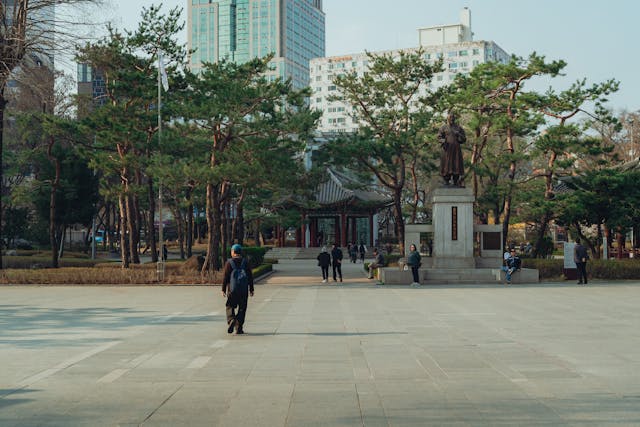Korean Negation with 안 an, 못 mot, and 지 ji… 않다 anda
In this post we’ll look at negation in Korean. There are a few different ways to negate verbs and adjectives in Korean, and we’ll cover them here. First, we’ll start with the simplest kind of negation, also known as short negation, with 안 an. Next, we’ll see a second short negation, 못 mot, which specifically refers to ability. After that, we’ll turn to long negation with 지 ji… 않다 anda. Finally, we’ll see some Korean verbs that are inherently negative, one of which is extremely common.
Short Korean Negation with 안 an
First, let’s start with the easiest kind of negation in Korean. To form a short negation, simply put the particle 안 an right before the verb or adjective (which, remember, is a verb in Korean.)
- 커피를 안 마셔요.
keopi-reul an masheoyo.
I don’t drink coffee. - 두부를 안 먹어요.
dubu-reul an meogeoyo.
I don’t eat tofu. - 고기를 안 먹습니다.
gogi-reul an meogseumnida.
I don’t eat meat. - 야구를 안 좋아해요.
yagu-neun an joahaeyo.
I don’t like baseball. - 이 집은 안 커요.
i jip-eun an keoyo.
This house is not big. - 이 집은 안 비싸요.
i jip-eun an bissayo.
This house is not expensive. - 공원에 안 갔어요.
gongweon-e an gasseoyo.
I didn’t go to the park. - 공부 안 했어요.
gongbu an haesseoyo.
I didn’t study.
Short Korean Negation with 못 mot
Now let’s look at negation with the particle 못 mot. The negative particle 못 mot functions just like 안 an, but it has a different meaning. Use 못 mot when you’re negating an ability. It’s similar to cannot, not able, or don’t know how to in English.
- 한국어를 못해요.
hangugeo-reul mot haeyo.
I don’t/can’t speak Korean. - 그 남자는 중국어를 못해요.
keu namja-neun junggukeo-reul mot haeyo.
That man doesn’t/can’t speak Chinese. - 저는 수영을 못해요.
jeoneun suyeong-eul mot haeyo.
I can’t swim. I don’t know how to swim. - 한국어를 이해 못 해요.
hangugeo-reul ihae mot haeyo.
I can’t understand Korean. - 제가 피아노를 못 쳐요.
jega pianoreul mot chyeoyo.
I can’t play piano. I don’t know how to play piano. - 공부 못 했어요.
gongbu mot haesseoyo.
I couldn’t study. I wasn’t able to study. - 어제 너무 피곤해서 숙제를 못 했어요.
eoje neomu pigonhaeseo sukjereul mot haesseoyo.
I was too tired yesterday, so I couldn’t do my homework.
Long Korean Negation with 지 ji… 않다 anda
Next, we’ll turn to long Korean negation. Placing 안 an or 못 mot right before the verb is the easier way to form a negative in Korean. But long negation is just as common. It means the same thing and is almost always interchangeable with short negation. It’s more typical in official or formal language, but not at all limited to it.
Forming Long Negation with the Verb Stem
The shape of a Korean long negative is:
verb stem + suffix –지 –ji + conjugated form of 않다 anda
So, the first thing you need to do is find the verb stem. The verb stem is very easy to form. Simply remove the final –다 –da of the dictionary form, and you’re left with the verb stem. This is what you add –지 –ji to for the long negative. And finally conjugate the main verb 않다 anda (않아 ana / 않아요 anayo / 않습니다 anseumnida).
| Dictionary form | Verb stem | Negative |
| 하다 hada (to do) | 하– ha- | 하지 않아요 haji anayo |
| 먹다 meokda (to eat) | 먹– meok- | 먹지 않아요 meokji anayo |
| 마시다 mashida (to drink) | 마시– mashi- | 마시지 않아요 mashiji anayo |
| 가다 gada (to go) | 가– ga- | 가지 않아요 gaji anayo |
| 좋아하다 joahada (to like) | 좋아하– joaha- | 좋아하지 않아요 joahaji anayo |
In cases of negation with 못 mot (cannot), you’ll see the same지ji followed by 못하다 (못해 mothae / 못해요 mothaeyo / 못합니다mothamnida).
| Dictionary form | Verb stem | Negative |
| 하다 hada (to do) | 하– ha- | 하지 못해요 haji mot haeyo |
| 가다 gada (to go) | 가– ga- | 가지 못합니다 gaji mot hamnida) |
Examples of Korean Long Negation in the Present
- 밥을 먹지 않아요.
bab-eul meogji anayo.
I don’t eat rice. - 맥주를 마시지 않습니다.
maekju-reul mashiji anseumnida.
I don’t drink beer. - 한국어를 이해하지 못해요.
hangugeo-reul ihaehaji mothaeyo.
I don’t/can’t understand Korean. - 버스터미널에 가지 않습니다.
beoseuteomineol-e gaji anseumnnida.
I’m not going to the bus terminal. - 우리는 공항에 가지 않아요.
uri-neun gonghang-e gaji anayo.
We’re not going to the airport. - 나는 김치를 좋아하지 않아요.
na-neun kimchi-reul johahaji anayo.
I don’t like kimchi. - 이해하지 못합니다.
ihaehaji mot-hamnida.
I can’t understand. - 한국어를 잘 말하지 못해요.
hangugeo-reul jal malhaji mot-haeyo.
I can’t speak Korean well.
Examples of Korean Long Negation in the Past Tense
In the past, simply use a past tense form of 않다 anda (않았어 anasseo / 않았어요 anasseoyo / 않았습니다 anasseumnida) or 못하다 (못했어 mothaesseo / 못했어요 mothaesseoyo / 못했습니다 mothaesseumnida).
- 공원에 가지 않았어요.
gongweon-e gaji anasseoyo.
I didn’t go to the park. - 공부하지 않았어요.
gongbuhaji anasseoyo.
I didn’t study. - 공부하지 못했어요.
gongbuhaji mothaesseoyo.
I couldn’t study. - 친구들과 식당에 가지 않았어요.
chingudeulgwa shigdang-e gaji anasseoyo.
I didn’t go to the restaurant with friends. - 영화를보지 않았어요.
yeonghwa-reul boji anasseoyo.
I didn’t see a movie. - 영화를이해하지 못했어요.
anyeonghwa-reul ihaehaji mothaesseoyo.
I couldn’t understand the movie. - 학생들은 피자를먹지 않았어요.
hagsaengdeul-eun pija-reul meogji anasseoyo.
The students didn’t eat pizza.
Korean Negation with Inherently Negative Verbs
Korean has a few verbs that are inherently negative. This means that there’s no need to negate them, because they are already negative.
없다 eopda
By far the most common one is 없다 eopda (없어 eopseo / 없어요 eopseoyo / 없습니다 eopseumnida) which is the negative of 있다 itda (to exist, to be located) (있어 isseo / 있어요 isseoyo / 있습니다 isseumnida). These verbs are most often used for possession and location. (Remember to use the subject particle –이/-가 -i/-ga for the possession.)
- 집이 있어요. / 집이 없어요.
jip-i isseoyo. / jip-i eopseoyo.
I have a house. / I don’t have a house. - 차가 있습니다. / 차가 없습니다.
cha-ga isseumnida. / cha-ga eopseumnida.
I have a car. / I don’t have a car. - 우리는 서울에 있어요. / 우리는 서울에 없어요.
uri-neun seoul-e isseoyo. / uri-neun seoul-e eobseoyo.
We are in Seoul. / We aren’t in Seoul.
The past tense forms of 없다 eopda are 없었어 eopseosseo / 없었어요 eopseosseoyo / 없었습니다 eopseosseumnida.
- 차가 없었어요.
chaga eopseosseoyo.
They didn’t have a car. - 지호는 집에 없었어요.
jiho-neun jib-e eopseosseoyo.
Jiho wasn’t home. - 학생들은 도서관에 없었습니다.
hagsaengdeul-eun doseogwan-e eobs-eossseubnida.
The students weren’t at the library.
Remember to use 없다 eopda when you negate adjectival phrases that use 있다 itda.
- 국은 맛있어요. / 국은 맛없어요.
gug-eun mashisseoyo. / gug-eun mateopseoyo.
The soup is tasty. / The soup isn’t tasty. - 이 책은 재미있어요. / 이 책은 재미없어요.
i chaek-eun jaemi isseoyo. / i chaek-eun jaemi eopseoyo.
This book is interesting. / This book is boring. - 이 영화는 인기가 있어요. / 이 영화는 인기가 없어요.
i yeonghwa-neun ingiga isseoyo. / i yeonghwa-neun ingiga eopseoyo.
This movie is popular. / This movie is not popular.
모르다 moruda
Another important inherently negative verb is 모르다 moruda, which means not know or not realize.
- 저는 그 사람을 몰라요.
jeoneun geu sarameul mollayo.
I don’t know that person. - 저는 이 노래를 모릅니다.
jeoneun i nolae-leul moleubnida.
I don’t know this song. - 어제 시험이 있는 줄 몰랐어요.
eoje siheomi inneun jul mollasseoyo.
I didn’t know there was a test yesterday.
Get on the road to speaking Korean with the Language Garage!
We hope you’ve enjoyed learning about Korean negation. If you’d like to learn more:
- Follow us on Facebook, LinkedIn, BlueSky, Twitter, Threads, Mastodon, Instagram, or Pinterest. We publish lots of Korean vocabulary, grammar, and culture notes, so it’s a great way to pick up some new vocabulary and practice.
- Check out our other posts on Korean language, culture, and more.
- Enroll in affordable, flexible, and personalized private online Korean lessons or sign up for a small group online Korean class.
- Create a free Language Garage account to access tons of Korean vocabulary, grammar, and culture.
Photo by Khanh Nguyen:






